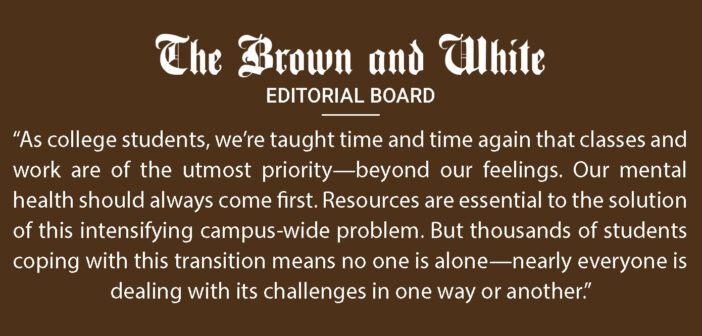Five-hundred and thirty-four days.
That’s how long it’s been for Lehigh undergraduates, in the classes of 2022 and 2023, since they last experienced in-person campus life prior to the start of this semester. It may as well be centuries ago.
For students graduating in 2024 and 2025, the start of this semester was their first experience with in-person campus life. These students came to Lehigh fresh from their final years of high school being completely online. It’s all brand new to them.
Some students may have lost their footing, forgetting the routine of in-person college. Or, they never had that footing to begin with.
Since the switch to fully remote classes in March 2020, students have lost touch with campus, resulting in both increased stress levels and mental health concerns.
According to a 2020 survey by the Health Advancement and Prevention Strategies office, 89 percent of Lehigh students had some concern about their mental health, whereas 29 percent of them had an extreme concern.
While a global pandemic as well as the switch to exclusively online courses for a year and a half may have provoked mental health issues in students, what can we expect from switching back?
Regardless of whether it’s been 534 days or not, going back to an in-person environment is a major adjustment for all students. No transition is simple, especially when it concerns a change in lifestyle or work environment.
Attention to mental health will continue to be critical, just as it was throughout the pandemic.
This adjustment is taking a toll on students. Mental health issues will only escalate from here.
Students will need resources for improving mental health now more than ever.
Upon returning to an in-person environment, however, it seems like all of the resources provided by Lehigh have dissolved. If those resources haven’t dissolved, then they lack the same emphasis that was placed on them at the peak of the pandemic.
While therapy provided by the university is available, it remains completely online and spots are limited. If that’s not available, students are forced to look off campus for support.
Is this enough to help the nearly one-third of Lehigh students who had “extreme concern” for their mental health? Would it be enough now?
Are there an adequate amount of resources for students on campus?
As college students, we’re taught time and time again that classes and work are of the utmost priority—beyond our feelings.
Our mental health should always come first.
Resources are essential to the solution of this intensifying campus-wide problem. But thousands of students coping with this transition means no one is alone—nearly everyone is dealing with its challenges in one way or another.
There shouldn’t be any fear in acknowledging a decline in your mental health. Recognizing that treatment and resources are needed isn’t a weakness.
Do what you need to do, whether that’s taking a short break or giving yourself a day or two off to devote to yourself.
If this means holding off on your assignments, reach out to your professors. Most professors are understanding and want to help—or at the very least, they should be.
It’s OK to struggle. It’s OK to grapple with this adjustment. You aren’t alone in dealing with this when there’s an entire community of students right behind you.
We’re all part of the same campus community. We understand each other’s struggles during this difficult time. We all want one another to succeed.
Adjusting isn’t easy, whether you know what you’re getting into or not. What you are feeling during this time, or ever, is valid and is nothing to be ashamed of.
Prioritize your health over everything else because, ultimately, you come first.






Comment policy
Comments posted to The Brown and White website are reviewed by a moderator before being approved. Incendiary speech or harassing language, including comments targeted at individuals, may be deemed unacceptable and not published. Spam and other soliciting will also be declined.
The Brown and White also reserves the right to not publish entirely anonymous comments.
1 Comment
joss website